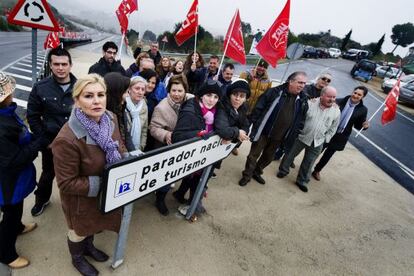Are the Paradores headed for ruin?
Spain's loss-making state hotel chain may have to be privatized to survive


When the Marquis de la Vega Inclán came up with the idea for the first Parador in 1926, he probably had no idea that one day there would be 94 state-run up-market hotels. The idea of putting the wealthy up in former palaces, convents and other unique historic buildings appealed to the then head of state, King Alfonso XIII. Four decades later, in the 1960s, General Franco's Spain began to develop the country's potential for tourism under the guidance of Minister Manuel Fraga, who created one in every province in the country. For many years Paradores were a profitable way of attracting visitors to little-known areas away from the country's coasts, generating further tourism and creating some employment in the process. But over the last decade, and particularly since 2008, growing numbers of Paradores have been run at a loss, and the chain is now losing money overall.
But some Paradores are highly profitable, such as the 15th-century convent in Granada at the heart of the Alhambra palace, where reservations have to be made months in advance, or the cloistered hotel dating back to 1499 in Santiago de Compostela that provides lodging for wealthier pilgrims and claims to be one of the oldest hotels in the world.
Part of the problem has been a decline in foreign guests, leading to dependence on the domestic market. What's more, the Paradores have high maintenance and repair costs, and mounting debts. The talk now is of privatizing the network.
The Paradores' CEO, Ángeles Alarcó - the ex-wife of one-time Bankia chairman Rodrigo Rato, and a former advisor to Esperanza Aguirre, the ex-head of the Madrid regional government - has said the chain has reached a point of no return. She accuses the former board, whose president was veteran Socialist Party member Miguel Martínez, a friend of former Prime Minister José Luis Rodríguez Zapatero, of mismanaging the company. In a bid to reduce its losses of 77.2 million euros, which will rise by a further 30 million euros by the end of the year, Alarcó announced two weeks ago that she was laying off 644 members of its staff of 3,400. Labor unions say that Paradores' new management wants to close seven of its hotels and limit the opening of 27 others to just seven months a year. They say the longer-term goal is to privatize the chain.
Labor unions say the management wants to close seven of its hotels
But Juan José Zaballa, the Paradores' director general, describes the new management's plans as "a rigorous study into the viability of each Parador based on an analysis of its profitability and demand." He adds that none of the proposed closures would affect Paradores located in historic buildings. So far he has not said to what use the buildings housing the soon-to-be former Paradores will be put. "They are the property of the National Heritage," he says, "and it will be up to the state to decide."
In 1991 the government converted Paradores into a limited company, ending state subsidies and requiring the chain to turn a profit using its own resources. Two decades later, after different governments appointed their own people to run it, Paradores de Turismo de España, SA, is 77 million euros in debt. But its decline has been rapid. In 2008, it was still turning a profit: 1.46 million. But the following year it lost 24.3 million euros, and last year it had accumulated debts of 87.4 million. Of that, 52.7 million were short-term loans, with a further 35 million to be paid up until 2014. The company's accountant noted in 2011 that the company had a "negative working balance of 118.4 million euros, along with accumulated debts of 41.6 million euros, and losses for the year 2011 of 35.6 million euros."
How did the group manage to get into so much trouble so quickly? To begin with, last year, the number of people staying in Parador hotels fell by 3 percent, giving the group an average 59 percent occupancy rate. Income fell by 5.7 percent, and the workforce was expanded, with operating costs rising by 7.6 percent. In 2009, a 168-million-euro strategic plan was put into place aimed at restoring 21 Paradores. The budget for the Cádiz hotel was 17 million euros, but ended up costing 40 million, a similar figure to the Álcala de Henares Parador, which had been restored in 2009.
The labor unions say these kind of major rebuilding projects are draining the company's resources, something Zaballa partially accepts: "They affect the balance and the debt, but not the company's results." He blames the economic crisis, along with "poor management of spending costs up until 2011." He also says the group's staff is much larger than other hotel chains, and blames what he calls the workforce's "serious lack of flexibility."
Paradores were a way of attracting visitors to areas away from the coast
The workforce points out that it has been subject to a wage freeze for the last three years, and that there will be no Christmas bonus this year. "All the signs are that the management is trying to prepare Paradores for privatization, or to sell it directly to a hotel chain," says Antonio Ruda of the CCOO labor union. He accuses the management of not doing enough to market the chain, while complaining about the poor performance of the previous team.
Aside from its unsustainable repair costs and a new management team every time the government has changed over the last two decades, the Paradores chain faces the problem of its relatively high rates at a time of recession: 96 euros a night compared to 83 euros at hotels of a similar quality. Furthermore, only one-third of its visitors are from overseas, making it heavily dependent on the domestic market at a time when consumer confidence is at an all-time low.
In the meantime, the government has just pumped 46.9 million euros into the group, increasing its capital to 166.9 million euros.
Paradores staff staged partial strikes over the weekend of December 8-9 to protest the announced closure of seven Paradores. Among the mooted closures are hotels in Ayamonte, Huelva, Teruel and Manzanilla, in Ciudad Real. Other stoppages are planned for December 31 and January 1.
Isabel Borrego, a secretary of state responsible for tourism, said the New Year strike was an "irresponsible" act, which would cause losses amounting to 1.5 million euros.
The strike announcement has already led to cancellations at many of the hotels. At the Parador do Albarino in the north-western region of Galicia, for instance, about 50 people cancelled their stays this weekend, the newspaper Faro de Vigo reported.
Tu suscripción se está usando en otro dispositivo
¿Quieres añadir otro usuario a tu suscripción?
Si continúas leyendo en este dispositivo, no se podrá leer en el otro.
FlechaTu suscripción se está usando en otro dispositivo y solo puedes acceder a EL PAÍS desde un dispositivo a la vez.
Si quieres compartir tu cuenta, cambia tu suscripción a la modalidad Premium, así podrás añadir otro usuario. Cada uno accederá con su propia cuenta de email, lo que os permitirá personalizar vuestra experiencia en EL PAÍS.
¿Tienes una suscripción de empresa? Accede aquí para contratar más cuentas.
En el caso de no saber quién está usando tu cuenta, te recomendamos cambiar tu contraseña aquí.
Si decides continuar compartiendo tu cuenta, este mensaje se mostrará en tu dispositivo y en el de la otra persona que está usando tu cuenta de forma indefinida, afectando a tu experiencia de lectura. Puedes consultar aquí los términos y condiciones de la suscripción digital.








































